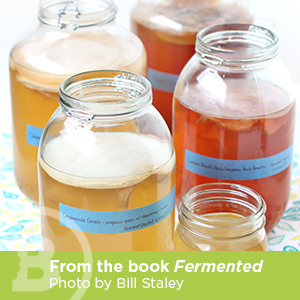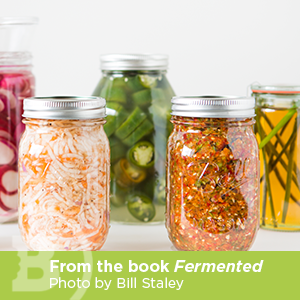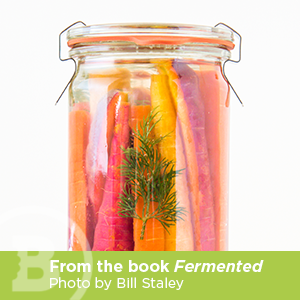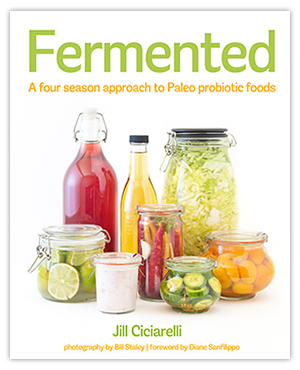Hello Balanced Bites fans! I’m Jill Ciciarelli and I’m the keeper of the blog, firstcomeshealth.com and the author of the just-released book, Fermented: A Four-Season Approach to Paleo Probiotic Foods. I am really grateful to Diane for asking me to write a little something for her readers. (Thanks, Diane!)
So, in thinking about what to write for all of you Balanced Bites readers, I admit to being a bit overwhelmed with topic choices. There are so many things to stay about fermentation and so many questions that get sent my way about fermentation that it was hard for me to choose just one thing to write about for this post. And while fermentation is really quite easy, safe, delicious, and healthy I get many emails and messages about getting started.
In light of this, I thought I’d offer a little Q and A. I’ll share my most frequently received reader questions. Hopefully I can cover the common issues out there and give you some basic answers to questions you may have about the craft of fermentation.
 1. What the heck is fermentation?
1. What the heck is fermentation?
Believe it or not, I get this one a LOT. Fermentation is the process of changing a food by introducing bacteria and/or yeast. It changes the flavor, texture, and nutritive value of food, makes it easier to digest, and is a delicious way to introduce beneficial enzymes and bacteria into your body.
While that may sound complicated or science-y, I swear you do not have to be a scientist or even own a lab coat to successfully ferment foods.
2. What are some common fermented foods?
When I was writing Fermented, I would tell people that I was working on a book about food fermentation. Most folks would wrinkle up their noses and say, “What’s that? I’ve never had fermented food before.” Chances are, they actually have eaten fermented foods, because many of our favorites are indeed a result of fermentation.
Obviously if you are a fan of alcoholic beverages, they you have definitely had a fermented food! Wine, beer, hard cider, rum, tequila, whiskey, vodka, gin, etc. are all fermented.
A list of common fermented foods includes yogurt (dairy and coconut milk versions), sauerkraut, vinegar, corned beef, pepperoni, kombucha, sourdough breads, and even chocolate! Yep, they are all fermented.
 3. Isn’t fermentation dangerous?/Isn’t bacteria bad for you?
3. Isn’t fermentation dangerous?/Isn’t bacteria bad for you?
In a nutshell, no, and no. Sadly, we live in a world that has been taught that all bacteria are agents of illness or even death and must be killed. We live in a world where everything is disinfected and sterilized. Even to the point where we are carrying around vials of antibacterial sprays and gels to slather on our hands and we are swabbing down our carts at the supermarket before we do our weekly shopping.
To be clear, there are some dangerous bacteria out there that can make us ill. But there are more bacteria out there that help us and that, believe it or not, we actually need for survival. Our bodies are more bacteria than human cells! These critters outnumber us by 10 to 1. Without these little guys, we wouldn’t have healthy guts or robust immune systems. We need bacteria.
The craft of fermentation is all about cultivating the good guys and not giving the bad guys a fighting chance. To do this is not complicated or difficult, and in return we are rewarded with good health.
4. Does fermentation require a lot of expensive equipment and space?
For the longest time I held back from ever exploring the world of fermenting foods because I (incorrectly) assumed that it required a kitchen full of specialized equipment. Boy, was I wrong.
My friend, Liz, offered me a kombucha SCOBY and I turned it down saying that I didn’t have the room in my kitchen or budget for a bunch of fancy equipment and tools. When she explained that all I needed was a glass jar, I was stunned. I thought the exact opposite was true and I would need to fill my kitchen with all kinds of brewers’ tools. Nope.
Fermentation has been around for centuries. Back in the day, there weren’t fancypants continuous brewing rigs, artisan crocks, hand carved kraut muddlers, pH strips, racking canes, or even refrigerators. The same procedures used to ferment foods before any piece of specialized equipment was invented are the same procedures we can use today.
Now, don’t get me wrong, equipment and tools are nice to have and can make our lives much easier, but if anyone tries to tell you that more than the basic implements (say, a knife, and a jar, and some salt) are required, they are probably trying to sell you something.
 5. If I’ve never fermented anything before, what should I make first to get started?
5. If I’ve never fermented anything before, what should I make first to get started?
In Fermented I have outlined 16 basic ferments for you to try if you are a rookie. These are the very basic techniques you can use to try out different types of ferments and they are very simple and easy to follow.
With that said, making a basic sauerkraut is quite simple and yields great results. If you are avoiding goitrogens (substances found in cabbage that interfere with thyroid function), then skip the cabbage and try fermenting carrots. It’s also a terrific first-foray into fermentation that is fast, easy, and yummy.
6. How will I know if something goes wrong?
Fermentation is a craft that doesn’t require any skill, but it does require care. If you are properly caring for your ferments, paying attention to them, and making sure they are getting everything they need, the process is almost foolproof. However, things can go awry. Despite your best efforts, a batch of kombucha can go moldy or get bugs in it. You can do your best to keep a jar of kraut at the optimal temperature, but it can still have a weird taste. Sometimes it just happens.
Fermentation is not an exact science. We cannot control for every single variable and it is important to remember that we are dealing with live organisms. As with everything in life, I strongly recommend that you use your best judgment. If the taste or texture of one of your ferments is “off” or in any way unappetizing to you, don’t eat it. It is as simple as that.
7. Do you have any last words of advice before I take the plunge into the world of fermentation?
Yes! Be adventurous and be creative. Fermentation can be as simple or as exotic as you make it. If you are brand new to the craft, go for the gusto! Try something new to you and be confident that you’re going to find a new favorite food. Fermentation is simple, unique, and healthful.
 If you have picked up a copy of Fermented (and I really hope you have!), then start with the 16 basic recipes for various kinds of ferments. They stand alone as great, easy, basic how-tos that are terrific for newbies. After you feel confident with the techniques, use them as launching points for you to explore your own culinary artistry. Please get creative!
If you have picked up a copy of Fermented (and I really hope you have!), then start with the 16 basic recipes for various kinds of ferments. They stand alone as great, easy, basic how-tos that are terrific for newbies. After you feel confident with the techniques, use them as launching points for you to explore your own culinary artistry. Please get creative!
Most of all, I wish you all the best ferments. I hope you’ll grow to be as excited about fermentation as I am. It is a terrific craft that can add so many unique flavors to your diet and enhance your overall health.
Drop me a line sometime and let me know what you think of Fermented – [email protected]. And don’t forget to join me over on my blog, firstcomeshealth.com, on Facebook, Instagram, and on Twitter to see all the bacterial happenings in my kitchen and more.
![]()
About the Author of Fermented
 Jill is the owner of First Comes Health and a certified holistic health coach. Despite exploring her health for many years and even considering herself a “healthy hobbyist,” she didn't feel as though her efforts were paying off.
Jill is the owner of First Comes Health and a certified holistic health coach. Despite exploring her health for many years and even considering herself a “healthy hobbyist,” she didn't feel as though her efforts were paying off.
She quit her job and turned her hobby into a real passion by starting to work out regularly and getting to know how her everyday habits affected her. Through trial and error, she slowly realized that every tiny step she took in the right direction took her closer to feeling better and living the life she's so happy with now. This led to the realization that she could be a guide and teacher for others who were trying to find their way down the same path.
Jill graduated from the Institute for Integrative Nutrition as a holistic health coach and she is certified by the American Association for the Drugless Practitioners. She is incredibly grateful for the opportunity to be a part of people's lives via her books and website, and finds true thrill in helping others make small changes and see huge benefits.


Comments 7
WANT!
I can’t wait to read this one!
On my “Want List”!!! Can’t wait to get it (either winning or buying!)
This book looks awesome!
After being inspired by your podcast appearance on Balanced Bites, I received a kombucha SCOBI and a fermented vinegar with a live culture from a local food swap event – I cannot wait to get my hands on your book so I can learn what to do with both of these! help! 🙂
Fermentation is so awesome. I started after reading “The Art of Fermentation” by Sandor Katz which I highly recommend if you haven’t read it. This post is fabulous and I will certainly give your book a go as well. Thank you!